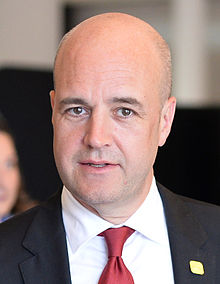Fredrik Reinfeldt
| Fredrik Reinfeldt | |
|---|---|
 |
|
| 32nd Prime Minister of Sweden | |
|
In office 6 October 2006 – 3 October 2014 (7 years, 362 days) |
|
| Monarch | Carl XVI Gustaf |
| Deputy |
Maud Olofsson Jan Björklund |
| Preceded by | Göran Persson |
| Succeeded by | Stefan Löfven |
| Leader of the Moderate Party | |
|
In office 25 October 2003 – 10 January 2015 |
|
| Deputy | Gunilla Carlsson |
| Preceded by | Bo Lundgren |
| Succeeded by | Anna Kinberg Batra |
| Personal details | |
| Born |
John Fredrik Reinfeldt 4 August 1965 Österhaninge, Sweden |
| Political party | Moderate Party |
| Spouse(s) | Filippa Holmberg (1992–2013) |
| Domestic partner | Roberta Alenius (2015– ) |
| Children | Gustaf Eric Ebba |
| Alma mater | |
| Signature | |
John Fredrik Reinfeldt (pronounced [ˈfreːdrɪk ˈrajn.ˈfɛlt]; born 4 August 1965) is a Swedish economist, lecturer and former politician who was Prime Minister of Sweden from 2006 to 2014 and was also the chairman of the liberal conservative Moderate Party from 2003 to 2015. He was the last rotating President of the European Council in 2009.
A native of , Reinfeldt joined the Moderate Youth League in 1983, and by 1992 had risen to the rank of chairman, a position he held until 1995. He served as Member of Parliament from 1991 to 2014, representing his home constituency. Reinfeldt was elected party leader on 25 October 2003, succeeding Bo Lundgren. Under his leadership, the Moderate Party has transformed its policies and oriented itself towards the centre, branding itself "the New Moderates" (Swedish: Nya moderaterna).
Following the 2006 general election, Reinfeldt was elected Prime Minister on October 6. Along with the three other political parties in the centre-right Alliance for Sweden, Reinfeldt presided over a coalition government with the support of a narrow majority in parliament. At the age of 41, he was the third-youngest person to become Prime Minister of Sweden.
Reinfeldt's first term in office was marked by the late-2000s financial crisis and recession. His popularity fell until the economy of Sweden emerged as one of the strongest in Europe; this brought a resurgence of support for him, resulting in his government's re-election in 2010. Despite the Moderate Party getting its highest share of the vote since the introduction of universal suffrage in 1921, Reinfeldt's government was reduced to a minority government, owing to the rise of Sweden Democrats; but he remained in power as the first centre-right Prime Minister since the Swedish-Norwegian Union to be re-elected.
...
Wikipedia
